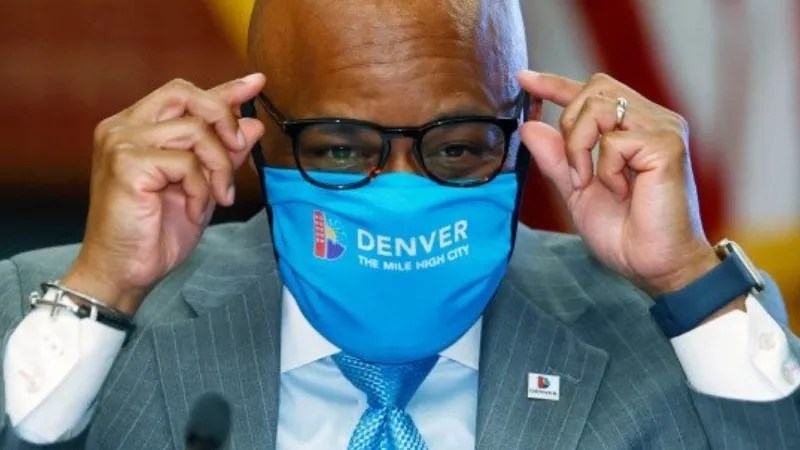

Audio By Carbonatix
On January 4, three days after revealing that he had tested positive for COVID, Mayor Michael Hancock emceed a press conference during which many of the most respected health-care professionals in the state took turns raising the alarm about the ongoing viral surge being driven by the Omicron variant.
Horror stories and worrisome predictions were the order of the day, with Kathy Howell, the chief nursing officer at the University of Colorado Hospital, summing up the concerns in a single sentence. The next month, she said, “is probably going to be the scariest point of the pandemic.”
The briefing participants, who were all remote, included Howell, Denver Department of Public Health and Environment Executive Director Bob McDonald, Denver Health Chief Medical Officer Dr. Connie Price, Children’s Hospital Colorado Chief Medical Officer Dr. David Brumbaugh, Jefferson County Public Health Executive Director Dr. Dawn Comstock, Tri-County Health Department Executive Director Dr. John Douglas and Broomfield Public Health Director Jason Vahling. But Hancock led off the proceedings with an update about his condition, crediting the fact that he’s been both vaccinated and boosted for the mildness of his symptoms, which he characterized as “cold-like.”
Hancock then noted that the seven-day average case rate for the Mile High City was approximately 1,000 per 100,000 people, which he called “the highest it’s been throughout the entire pandemic.” Meanwhile, the positivity rate in Denver is “nearly 25 percent – so at least one in four people being tested are positive.” To make matters worse, he added, “hospitalizations are climbing again and hospital capacity is razor-thin. … It’s becoming a critical issue.”
The DDPHE’s McDonald underscored these worries. He acknowledged that breakthrough cases such as Hancock’s will likely become more frequent, but emphasized that most of those in a similar circumstance will avoid hospitalization; most vaccinated and boosted folks who become seriously ill suffer from “co-morbidities or other underlying health problems,” he noted. Meanwhile, around 78 percent of those presently hospitalized in Colorado are unvaccinated – and it’s extremely difficult to predict who will be hit hardest.
“I’ve never seen an emergency pathogen as random as COVID-19 in terms of taking the life of an otherwise healthy adult or the life of a child who’s otherwise healthy,” McDonald admitted. But it’s “pure math,” he added, that Omicron’s increased transmissibility will inevitably lead to more serious cases among people who refuse to be immunized. As a result, he defended the decision of Denver officials and their regional partners to extend the pre-Thanksgiving mask-or-vax public health order for everyone age two or older to at least February 3.
Then the assorted health-care experts weighed in, and they had plenty of unpleasant news to share. Speakers revealed that many area hospitals are at or over capacity for acute-care beds, with some patients forced to linger for hours in emergency rooms or temporary staging areas while waiting for a space to open up. Moreover, the situation can worsen quickly; McDonald said he recently spoke with a colleague at a hospital that had fourteen COVID patients one morning and over sixty by day’s end.
Such problems are being exacerbated by the necessity of transferring patients to Denver or Front Range facilities when medical centers in more remote regions are swamped. And Vahling said the scenario will almost certainly be worsened by the current closure of Louisville’s Centura-Avista Adventist Hospital owing to the Marshall fire in Boulder County.
These troubles extend well beyond the state’s borders. Howell said that the University of Colorado Hospital has been forced to turn down “many requests” from neighboring states to transfer patients here “so we can prioritize our Colorado patients.”
Nonetheless, Children’s Hospital Colorado exec Brumbaugh argued passionately for schools to remain open for in-person learning despite the risks, since his institution has been inundated with young patients with behavioral-health issues connected to the pandemic. McDonald seconded this, stressing that the City of Denver isn’t considering actions that would force schools into remote status on a widespread basis. Jeffco’s Comstock argued that in-class masking can help prevent such shutdowns from happening and encouraged parents not to give schools “a hard time” for enforcing face-covering rules. Still, staff shortages caused by COVID infections could lead to scattered outbreaks and closures, the officials conceded.
Another ripple effect from the pandemic identified by Price: People with non-COVID-related health issues are often experiencing longer hospital stays because they put off dealing with getting proper medical care until becoming so sick that waiting is no longer an option. Hancock mentioned as an example an elderly person of his acquaintance who delayed treating a broken arm for two days.
No wonder the hospitalization forecast for January was so grim. See the entire press conference below: